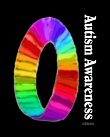Tuesday April 10, 2007
This is something that has been annoying me. Why is it when a person with an autism spectrum diagnosis is skilled in some area, is it called a ’splinter skill’. Why can’t it just be a skill. It seems like referring to it that way minimizes it as something less worthy of recognition and praise than if an NT person had the same, exact skill. For example, if a kid learns to read really young and they are NT, they are praised for being really smart, and the parents for obviously exposing them to literacy. If a kid learns to read really young and has an ASD diagnosis, it is a splinter skill, and/or hyperlexic, but is rarely acknowledged to be an accomplishment from hard work or parents who value literacy. It is somehow ‘less’, when, in reality, I think it should be ‘more’. When you struggle to say a sentence, I think it is pretty neat that you can read one.
It is irritating enough when people have no problem pointing out weaknesses, but when they also denigrate the strengths, I find it totally disrespectful and irritating. It is something I am used to hearing and don’t particularly take offense when I hear it IRL, because I hear it all the time and, it is usually not said with any sort of ill intent because it is a common technical term in the ASD world. I just think that it is one of the lexicons that really needs to be shifted or eliminated to reflect a more affirming motive when describing a skill.


Let me add to the Will Cuppy quote that’s floating around:
“If a cat does something, we call it instinct; if we do the same thing, for the same reason, we call it intelligence.” If an ASD kid does it, for the same reason, we call it a splinter skill.
Can’t we just refer to it innate and intrinsic brilliance? cats and people, both general and ASD.
It is called a splinter skill because the skill splinters off from the age range of the rest of the child’s skills categorized by the age level the child is performing at. My son used to have splinter skills but it seems that he has “evened out” a few years ago and now none of his skills are advanced or even age appropriate. I have heard the term used most often in elementary aged kids with ASD. I am not saying it is right or wrong to use the term “splinter skill”. Unfortunately, it is just one of those terms you get used to hearing and using such as, “stimming”. Our kids don’t have interests or hobbies. The have obsessive stims. Our kids are not brilliant at recalling dialouge from movies, they have echolalia. It is really sad, but you did get used to using the jargon over the years. I swore I would never use those words to describe my son or his actions, but no matter how hard I fought it…I can now speak the autism lingo as well as any professional who works with those with ASD and from time to time, people new to working with autistic individuals actually ask me what the terms mean.
I get really annoyed by people that tell me they are sorry when they find out that David has an ASD. Why are they sorry? I’m not.